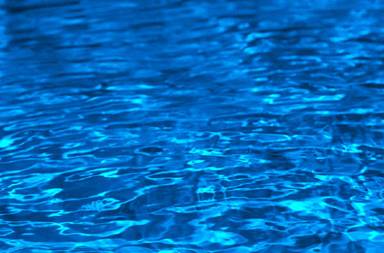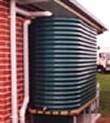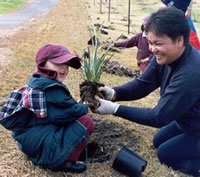
Individuals and Families
 
At Home
• Use a plug, using a plug can reduce the amount of water used for washing dishes.
• Have shorter showers and install a water-saving shower head, they can save many litres of water. They are inexpensive, about $20 and you can get them from hardware stores.
• If you have a dishwasher, do a full load of washing, as they use up a lot of water, in fact they are the second biggest wasters of water in your home.
• The biggest waster of water in your home is your washing machine; the best way to reduce the waste is by doing a full load of washing. Also, different types of machines can be more efficient in their water use than others. For example, front loaders use less water than top loading machines. When buying a new machine, check the energy and water use rating is high, e.g. 5 star rating is the best.
• Don't leave taps running, whilst brushing your teeth or shaving.
• Buy a rain water tank - the rain water collected on your property can be used for watering the garden, flushing the toilet and even for your washing machine if plumbed in. Rainwater tanks are about $2,000 - $3,000. When you consider the long term benefits to your household, a rainwater tank is an excellent investment. Sydney Water are currently offering rebates on the purchase and installation of rainwater tanks. Also, check out Green Plumbers for more information on rainwater tank installation.

Rainwater Tank
• If you have to wash your car, use a bucket so you can control the amount of water that you are using. Also wash your car on the grass, not only do you water the grass at the same time as washing your car, but you can also fertilise the grass at the same time - there are a lot of chemicals in the carwash products that act as nutrients for the soil and grass.

In the Garden
Watering plants
• Use a 1.25L soft drink bottle that is empty, cut off bottom, then poke some holes in the neck of the bottle and place the neck in the ground, then fill half way with water near the roots of the plant/tree. This way the water is going to the roots of the plant/tree & minimising evaporation.
• Use the grey water from your laundry to water your plants. Not only does this conserve water, but it also gives the plants extra nutrients - many laundry detergents contain phosphorus which is an essential nutrient for plants, which, incidentally, Australian soils naturally lack. But do not use grey water in excess because too much grey water used on the garden can be harmful to the environment, as the nutrients might not be able to taken up into the soil, leading to runoff. There are restrictions on the amount of grey water someone can use on there garden for this reason. Take a look at the Sydney Water website for further details www.sydneywater.com.au
• Use water crystals which act as wetting agents in the soil around the plants' roots, these crystals save you from having to water the garden on a regular basis.
• Mulch plant beds, mulching retains the moisture in the ground, as evaporation of water is stopped by the mulch. Mulching also inhibits weed growth!
• Plant native vegetation, Australian plants have evolved with our continents various climatic conditions such as drought. They can survive with water for longer than say tropical vegetation which requires water on a regular basis. Succulents such as cacti and agaves (e.g. Aloe Vera) store water and can survive for longer without it.
• Be selective about the plants you water, don't water weeds - pull them out! If a plant needs particular attention because it is dry, water it and leave other plants for another day.

Communities
• Councils can participate in Green Awards, which encourage achievements in the local government area, in the environment. Hurstville City Council is an example of a local government area in Sydney that has given awards to local residents for protecting the local environment, through community projects, such as the restoration of an environmentally degraded area and better water efficiency designs.
• Councils could introduce household water-use quotas in their government area and charge households a rate of, say, 60-70cents per KL. Each household would be given a quota: if a household goes over that quota it may be charged more for the excess water used; and if a household goes under that quota it may be charged less. An example of this is in the Page Water Plan, designed by the Page Research Centre take a look at http://www.page.org.au, then look at the Water Proposal Discussion Paper, by the Hon Bruce Scott MP and Troy Whitford.
If you really want to reduce the amount of water that you are using in your household, think about the everyday things that you use water for, and try to think about ways of reducing your water consumption, when washing up, doing the laundry and having a shower just being aware of your water use can help you reduce water consumption and help save water.
Why not have an environmental audit done on your household? A certified environmental auditor comes to your home, looks at the different uses of water in your house and makes suggestions as to what steps you can take to reduce water consumption. Contact Green Plumbers for more information.
References for pictures
www.hurstville.nsw.gov.au
www.rockdale.nsw.gov.au
Back to home page |



